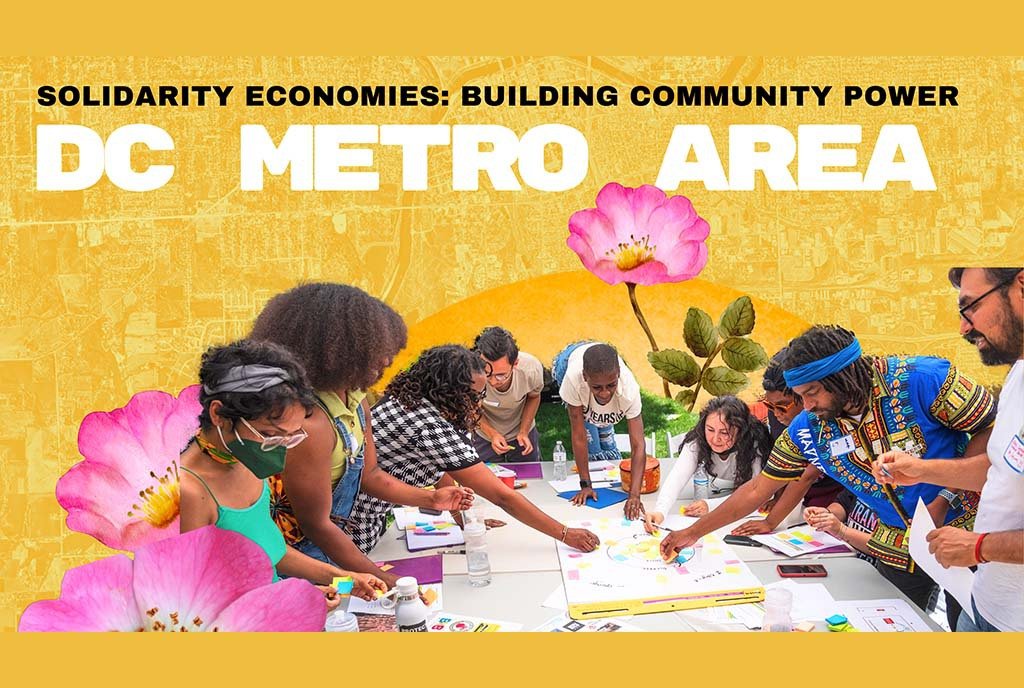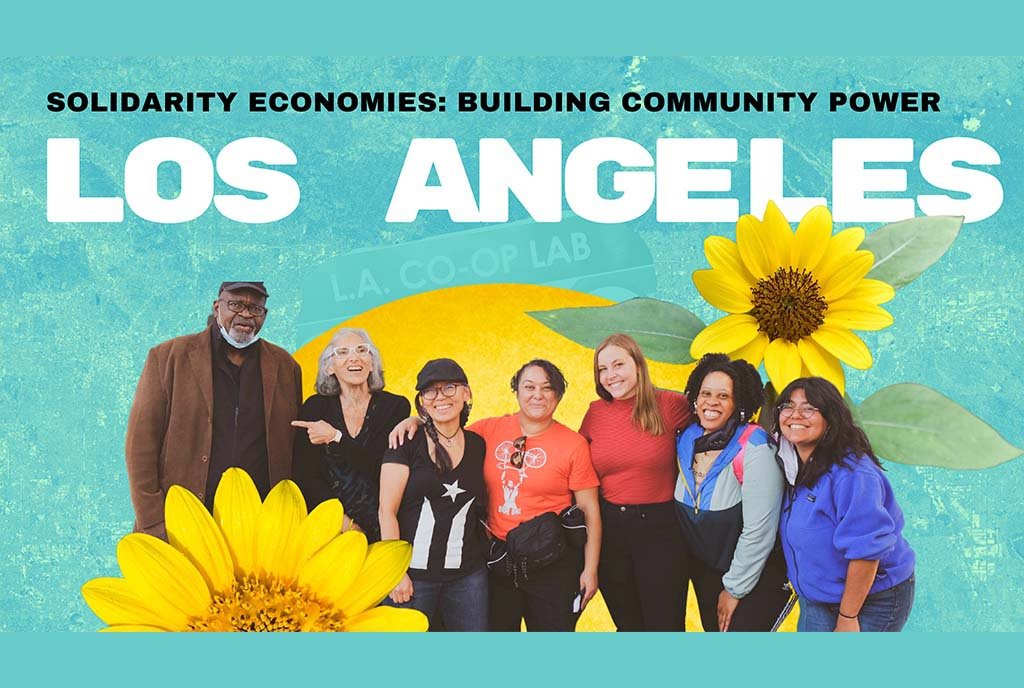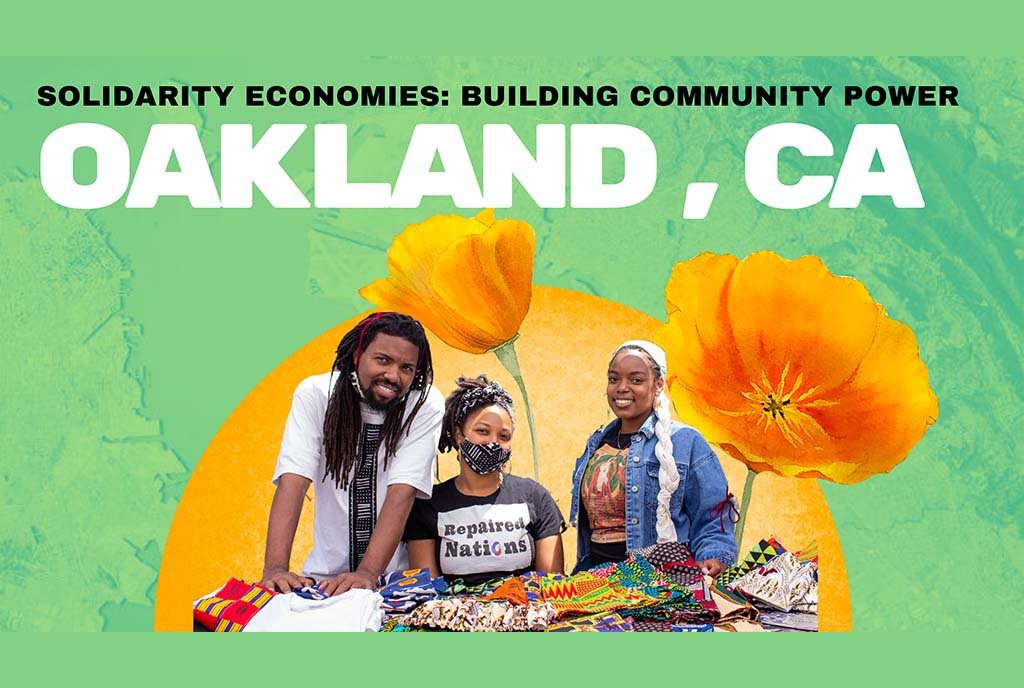
This is the fifth article in NPQ’s series Solidarity Economies: Building Community Power. Coproduced with the New Economy Coalition—a coalition of over 100 organizations building the solidarity economy in the United States—this series highlights case studies of solidarity economy ecosystems that are returning wealth and building grassroots power in cities across the country.
Achieving liberation requires envisioning a life outside of the exploitation and predation found in extractive capitalism. At Repaired Nations, a group I cofounded in December 2017, we are animated by the belief that the putrid roots of today’s economic system can be healed.
The democratic enterprises we are developing are inspired by Pan-African principles. We see our work as restoring Black people’s lost connection to lineage and reflecting our deep desire to bridge the gap. For too long, our community has borne the brunt of capitalist exploitation.
We see our work as restoring Black people’s lost connection to lineage and reflecting our deep desire to bridge the gap.Below, I offer Repaired Nations’ journey so far—and our vision for where Repaired Nations and the solidarity economy is headed next—as a guiding light for those who dream of a better tomorrow.
Early Vision and Successes: Our Beginnings
Repaired Nations emerged from a very intimate and personal process by a group of nine people organized into what we called the Kikosi Collective (kikosi is Swahili for “squad”). Though based in Oakland, our vision was global: we dreamed of buying a resort in Kenya to create a cooperative healing sanctuary for the Pan-African Diaspora.
But this dream met the same fate as countless other ideas in the early aughts—we were “too inexperienced” and lacked the social capital to get this idea off the ground. Finding our path required learning more about tools and economic strategies that would enable us to realize our vision, if not yet in Kenya, at least in our hometown of Oakland.
We sought to create a gathering association for Black cooperatives in California and beyond.
Interning at the Sustainable Economies Law Center in Oakland, I got a bird’s-eye view of the cooperative ecosystem and what cooperatives could do. I was inspired by the large-scale cooperative development that happened in Italy and Spain. Italy’s Marcora Law helped redevelop the entire Emilia-Romagna region by allowing laid-off and unemployed workers to pool their unemployment benefits to either take over a closing business or start a new one. Spain’s Mondragón network proved that a federation of cooperatives can compete in the global economy, with over 100 federated companies, a bank, and a university generating billions in revenue.
In the United States, we found the Federation of Southern Cooperatives as a regional grouping that we felt was worthy of emulation. Repaired Nations was created out of our dreams for what was possible at home as we sought to create a gathering association for Black cooperatives in California and beyond.
Out of this study of alternative models for solidarity cooperatives worldwide and indispensable books such as Collective Courage by Dr. Jessica Gordon Nembhard, we sought to build a thriving Black cooperative ecosystem in Oakland. Repaired Nations is structured as a multi-stakeholder cooperative with multiple membership categories, including staff, community supporters, and investors. Each membership category has unique sets of benefits and responsibilities that contribute to the whole.
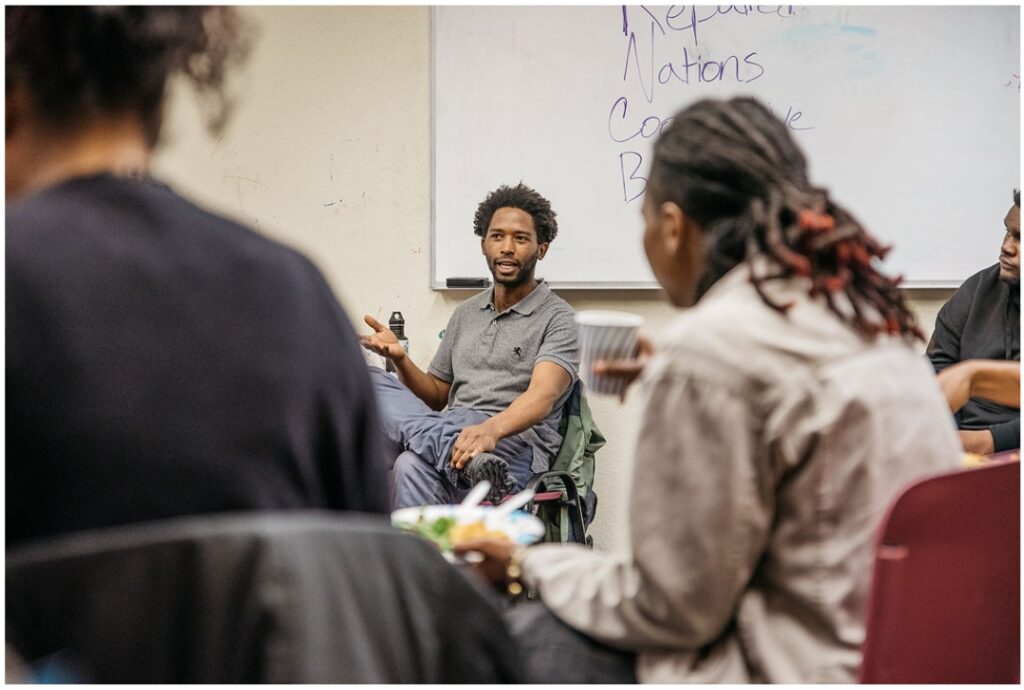
Understanding that preexisting relationships are key to sustaining Black-led cooperatives, I first enlisted the friends I had made during law school. Eight people came on board; most of these founders have remained involved with the organization since late 2018. This is how the Kikosi Collective developed.
Gathering people around a cause legitimized the work in a way only community word of mouth can. Together, we hosted a monthly book club and a workshop series in 2019 that laid the foundation for what is present today.
Experience taught me that the organization’s success would depend upon a dedicated team. But I also knew that economic pressures make it incredibly difficult for Black people to choose actions aimed at liberation because survival and preservation take precedence. Our ability to quickly launch and scale is in direct correlation with the two-year paid fellowship that I received from Equal Justice Works and the first $50,000 grant we received from the San Francisco Foundation.
We also knew we had to continue to connect our work to our Pan-African vision. This, we decided, required traveling to the home of our ancestors in Ghana.
Sign up for our free newsletters
Subscribe to NPQ's newsletters to have our top stories delivered directly to your inbox.
By signing up, you agree to our privacy policy and terms of use, and to receive messages from NPQ and our partners.
Gathering people around a cause legitimized the work in a way only community word-of-mouth can.
A Year of Return
Global liberation through Pan-African liberation is a core principle of Repaired Nations. The year 2019 proved to be an important year for the Black liberation movement, marking the 400th anniversary of the arrival of enslaved Africans to what would become the United States of America.
It’s perhaps less known that 2019 marked the midpoint of the United Nations’ “Decade for People of African Descent,” which was proclaimed in 2014 and extends from 2015 to 2024. In this context, we made a pilgrimage to Ghana in 2019. The purpose of our trip was simple: (1) inspire attendees to delve deeper into cooperative enterprise and (2) begin conversations between Ghanaians and Americans, with the hope for ongoing personal and business relationships.
A group of 30 people from across the United States landed in Accra, Ghana, with excitement and enthusiasm and then spontaneously gathered in prayer on this hallowed ground. For roughly 90 percent of us, this marked our first time ever touching the continent, and without philanthropic support subsidizing our trip, few of us would have made the journey. While in Ghana, we visited Kwame Nkrumah’s memorial, W.E.B. Du Bois’s home, slave dungeons, an ancient forest, and a cooperative fabric association. We held a conference with 70 Africans in attendance and learned about Ghana and the region. The conference focused on education, policy co-creation, and relationship building; and sought to connect cooperative activists in the United States with efforts in Ghana.
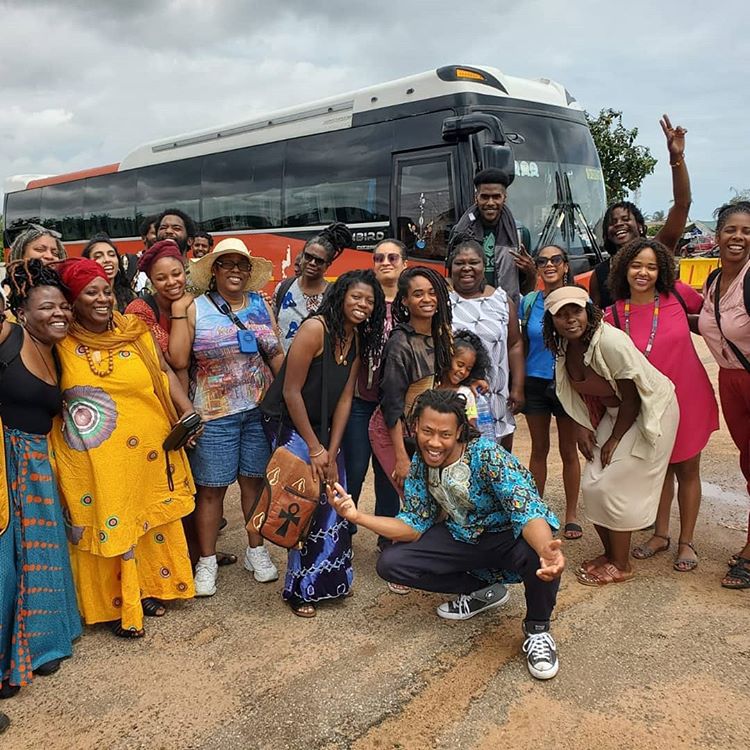
Having witnessed firsthand the power of cooperative effort abroad, we returned to the United States ready to work on our own.
Toward Cooperative Flourishing
From its inception, Repaired Nations recognized that few cooperatives exist in Oakland’s Black communities. To change this, it is critical to be able to physically point to changemakers. For the past six years, we’ve focused on building the local signposts that help the wider community understand the impact cooperatives can have. Below are descriptions of a few emerging cooperative enterprises we have helped grow:
- Authentik Afrikan came out of a desire to establish businesses that connect the diasporans in California. Mia Jackson cofounded the clothing co-op with two sewing apprentices, bringing years of experience sewing clothes and costumes for herself and her family. During two years of operation during the pandemic, Authentik Afrikan employed three near-full-time workers and several part-time seamstresses to make chic Afrocentric masks and sweatpants. In the business’s first month of operation, it grossed $22,000. “I never really thought I could have my own business but doing it as a cooperative really makes it feel more like you can touch it,” Jackson says. With support from Repaired Nations, she elaborates, “instead of just making the masks, I started developing a business plan and looking at costs which helped me adjust my prices to be more reflective of the labor involved. I also started thinking more long-range.”
- OAXXANDA was created in 2020, when people came together seeking to create cooperatively owned, mixed-use space in Oakland. Since then, the organization has incorporated and written bylaws, raised more than $350,000 in funding, and conducted feasibility studies for several potential property acquisitions. Crsna Cox, one of the cofounders of the Kikosi Collective, reflects that initially, “I hadn’t built some skill sets for the type of work I’m doing now. I was just unfamiliar with working with Google Docs, templates, Canva; it was even hard to fill out an invoice.”
Personal and professional growth for people like Cox are paramount. Admittedly shy about taking leadership early on in his journey, Cox now regularly participates and facilitates meetings, co-coordinates OAXXANDA’s outdoor activations, and feels more confident to bring proposals forward. Cox describes a recent success: “We…had a celebration on the 10 acres of land we co-purchased. Through cooperative values and belief in ourselves, we went from just throwing an idea out there to actually accomplishing a goal and knowing this way of being is possible.”
- ANYxMEANS is an artist collective driven to empower artist communities by creating safe spaces to express themselves freely and network with industry professionals to build sustainable careers. FLUID Open Mic, their flagship project, attracts creatives at all levels to share their truth, test their craft, and receive empowering responses from their new audience. This monthly event is a primary generator for the Artist Development Program, which focuses on self-realization, art creation, and business implementation.
ANYxMEANS was started in April 2021 to create generational wealth for artist and activist Mandela Msani’s family and those around him; it didn’t seem like a nonprofit was a likely path to accomplish this, so they used a limited liability company structure, which is common with worker cooperatives. Msani credits Repaired Nations with breaking the “dusty ‘conscious community’” stereotype, showing that we can make money together rather than staying broke together.
- Holistic Underground is a newer co-op. Its members are working to co-create a world in which all people have access to a sense of purpose and belonging through organizational development and coaching. Cofounder Mazin Jamal is one of the original nine Kikosi Collective members and helped coordinate the Ghana conference. Jamal says, “Seeing the way that Repaired Nations was able to organize funds, organize resources, and organize people really gave me hope. It gave me inspiration to say it’s possible.” Jamal launched HU in an atmosphere that felt very lonely, devoid of Black people seeking to build the same world as he is.
“Cooperatives are the future, they’re the solution to so many of the world’s problems,” Jamal says. “Seeing Black people do it and seeing the connection between our culture and the way we…run and think and vibe….That connection was like, ‘Oh!’ My experience really changed how I see things, that’s why we started running like a co-op or self-directed nonprofit; it really changed our organization.”
Future Visions
How does one build a regional solidarity economy? As the vignettes above make clear, it takes a community. It takes money. And it takes building concrete examples that people can experience for themselves.
At Repaired Nations, we are fortunate to be part of an emerging local solidarity economy community that extends far beyond the co-ops that we have developed. Earlier this year in NPQ, Dr. Ayodele Nzinga wrote about the BlacSpace Cooperative. This group is a collective of Black women anchored by four organizations that support co-ops and Black artists, including the East Bay Permanent Real Estate Cooperative, a group that supports community land ownership citywide and is developing an arts and cultural center in West Oakland.
We are empowered by our far-reaching vision for Pan-African liberation. We recognize that our communities have historically been targeted and structurally excluded. We have lacked employment and ownership opportunities, been victimized by police terrorism, and suffered the horrendous effects of gang violence. We believe, however, that our cooperatives are creating a springboard for stronger communities, rooted in both the history of the African Diaspora, and our future.










